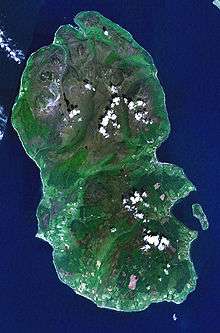Whiting Bay
| Whiting Bay | |
| Scottish Gaelic: Eadar Dhà Rubha | |
.jpg) Floral display and beach, Whiting Bay |
|
 Whiting Bay |
|
| OS grid reference | NS045255 |
|---|---|
| Civil parish | Kilbride |
| Council area | North Ayrshire |
| Lieutenancy area | Ayrshire and Arran |
| Country | Scotland |
| Sovereign state | United Kingdom |
| Post town | ISLE OF ARRAN |
| Postcode district | KA27 |
| Dialling code | 01770 |
| Police | Scottish |
| Fire | Scottish |
| Ambulance | Scottish |
| EU Parliament | Scotland |
| UK Parliament | North Ayrshire and Arran |
| Scottish Parliament | Cunninghame North |
Coordinates: 55°29′06″N 5°05′38″W / 55.485°N 5.094°W


Whiting Bay (Scottish Gaelic: Eadar Dhà Rubha) is a village located on the Isle of Arran in the Firth of Clyde, Scotland. The name Whiting Bay is thought to originate from "Viking" Bay. It is approximately 3 miles south of the village of Lamlash. Whiting Bay is the third largest village on the island (after Lamlash and Brodick) and was once the site of the longest pier in Scotland. Like all villages on Arran, tourism is important to the village.
The spectacular Glenashdale Falls with a nearby Iron Age fort and a prehistoric burial site the "Giants' Graves" are an easy walk from the village.
To the north of the village at Kings Cross Point between Lamlash and Whiting Bay is another Iron Age fort known locally as the "Viking Fort". According to local legend, this is the site where Robert the Bruce mistook farmers' fires on the mainland as the signal to launch his campaign. This site was also the location of a Viking ship burial excavated in the earlier 20th century.
Information about the history of Whiting Bay and of other sites on the Isle of Arran is available through the Arran Heritage Museum
Whiting Bay has a population of 680 people according to the 2011 UK Census (2011 Census)
External links
| Wikimedia Commons has media related to Whiting Bay. |
